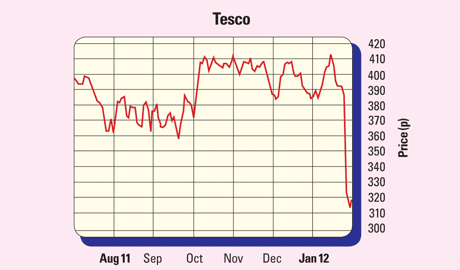Get the latest financial news, insights and expert analysis from our award-winning MoneyWeek team, to help you understand what really matters when it comes to your finances.
You are now subscribed
Your newsletter sign-up was successful
Want to add more newsletters?

Twice daily
MoneyWeek
Get the latest financial news, insights and expert analysis from our award-winning MoneyWeek team, to help you understand what really matters when it comes to your finances.

Four times a week
Look After My Bills
Sign up to our free money-saving newsletter, filled with the latest news and expert advice to help you find the best tips and deals for managing your bills. Start saving today!
A fortnight ago Tesco released its worst trading statement for 20 years, largely due to a £500m "Big Price Drop" promotion that flopped at the tills. But its recent problems can be fixed.
The price blitz has been ditched and replaced by a smarter spending-based loyalty programme. Next on the board's hit-list are sprucing up stores, sharpening customer service, and improving the quality of its fresh meats and fish counters. This will take time, which is why CEO Philip Clarke has indicated that earnings could be held back for most of 2012. But that's no reason for an investor to write off this retailing juggernaut.
Tesco is still the world's third-biggest retailer and dominates UK retail, which accounts for 65% of sales, with a 30% market share. Its own-label "value" and "finest" ranges are Britain's top two brands. The group also possesses outstanding data-mining and online services. These are racing ahead at an annual 14% clip. Internationally, sales are expanding at 8.2%, driven by strong performances in all three major regions of Asia, Europe and America.
MoneyWeek
Subscribe to MoneyWeek today and get your first six magazine issues absolutely FREE

Sign up to Money Morning
Don't miss the latest investment and personal finances news, market analysis, plus money-saving tips with our free twice-daily newsletter
Don't miss the latest investment and personal finances news, market analysis, plus money-saving tips with our free twice-daily newsletter
Tesco's banking arm has a solid balance sheet, with a £4.6bn loan-book funded by £4.8bn of customer deposits and a healthy tier 1 core capital ratio of more than 16%. Clarke is reining in the home store opening programme, which should be positive for future dividends.
Tesco (LSE: TSCO), rated a BUY by Deutsche Bank

The City is predicting turnover and underlying earnings per share (EPS) of £65bn and 34p respectively for the year ending February 2012, rising to £68.8bn and 35.9p 12 months later. The stock trades on a paltry price/earnings (p/e) ratio of ten and offers a 4.4% dividend yield as a hedge against inflation.
I value the British business on a nine-times earnings before interest, tax and amortisation (EBITA) multiple, the foreign operation on 0.9 times sales (£18bn), and the bank at £1bn. After adjusting for net debt of £7.6bn and a £1.2bn pension deficit, I arrive at an intrinsic worth of 390p a share.
I'm not the only one who thinks the stock is undervalued. A couple of non-executive directors have just spent more than £95,000 each on the shares, while American investor Warren Buffett spent £500m last week boosting his stake from 3.21% to 5.08%.
There are a few possible risks cut-throat competition, foreign exchange issues and consumer retrenchment but none should derail a recovery. Preliminary results are due out in mid-late April and Deutsche Bank has set a price target of 407p per share.
Rating: BUY at 330p
Paul Hill owns shares in Tesco.
Paul Hill also writes a weekly share-tipping newsletter, Precision Guided Investments. See www.moneyweek.com/PGI , or phone 020-7633 3634 for more.
Get the latest financial news, insights and expert analysis from our award-winning MoneyWeek team, to help you understand what really matters when it comes to your finances.
Paul gained a degree in electrical engineering and went on to qualify as a chartered management accountant. He has extensive corporate finance and investment experience and is a member of the Securities Institute.
Over the past 16 years Paul has held top-level financial management and M&A roles for blue-chip companies such as O2, GKN and Unilever. He is now director of his own capital investment and consultancy firm, PMH Capital Limited.
Paul is an expert at analysing companies in new, fast-growing markets, and is an extremely shrewd stock-picker.
-
 Should you buy an active ETF?
Should you buy an active ETF?ETFs are often mischaracterised as passive products, but they can be a convenient way to add active management to your portfolio
-
 Power up your pension before 5 April – easy ways to save before the tax year end
Power up your pension before 5 April – easy ways to save before the tax year endWith the end of the tax year looming, pension savers currently have a window to review and maximise what’s going into their retirement funds – we look at how